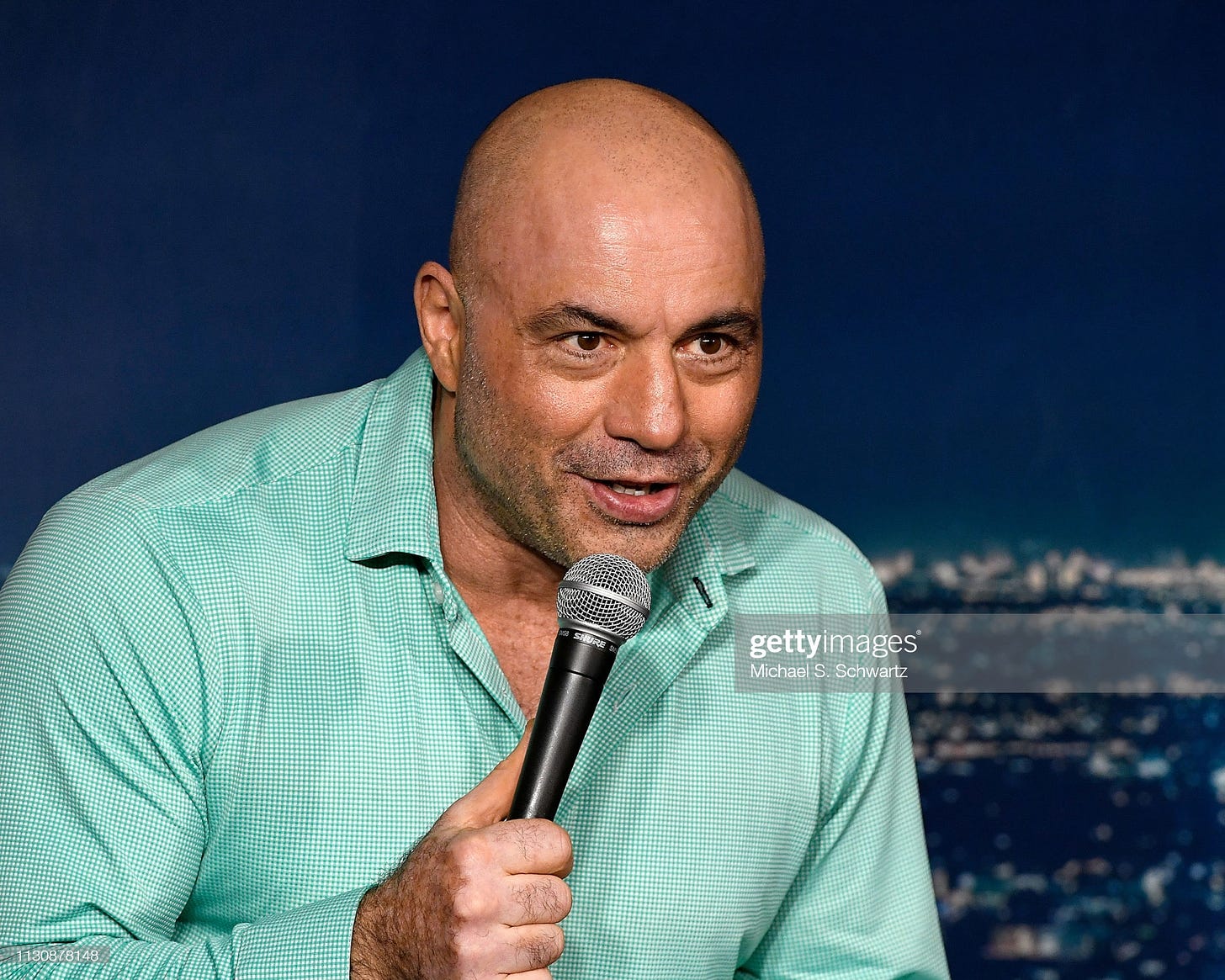The Un-Cancellable Mr. Rogan
The wildly popular Joe Rogan Experience podcast has drawn criticism of Spotify for COVID “misinformation,” including musician Neil Young's ultimatum and departure. Things remain at a stand-off.
Has Joe Rogan, the former Fear Factor host and podcast extraordinaire, finally met his match? Lately, Spotify, the platform that paid him USD$ 100 million for exclusive rights to the Joe Rogan Experience (JRE), has faced calls to stifle Joe’s “misinformation” about the pandemic virus. On January 10th, 'An Open Letter to Spotify' from more than 200 doctors and scientists kicked things off, Neil Young’s ultimatum took it up a notch. The rise in temperature peaked with Spotify’s investor call on February 2nd, which saw them temporarily lose billions in market share.
Spotify has tried to quell the grumblings by adding platform rules and a content advisory. The advisory directs listeners to their official COVID-19 Hub for trusted sources of information. But the calls keep coming.
The Algorithm Argument
The Spotify algorithm has been blamed for directing users to Joe’s interviews with outspoken and credentialled guests, instead of other “official” sources. Critics ask Spotify not to be a free-for-all marketplace but instead the arbiter of truth, suppressing unorthodox and contradictory ideas, like other social networks have done. In its defense, Spotify says it does not listen to JRE episodes before they are posted and pushes accountability to content creators to abide by guidelines.
If Spotify were to downgrade the JRE podcast in its recommendations, this would only deter the odd new listener. What about the 11 million people (more than any primetime news broadcast1) who regularly listen to episodes? This is a bit like randomizing the channel numbers on cable TV in the hope some people are so lazy they won’t search for their favorite show.
The criticism also hinges on the false assumption Spotify launched Joe. If anything, JRE launched Spotify’s podcasting ambitions, hence the price tag. Joe’s fanbase moved from YouTube, there is good reason to think they would follow him elsewhere.
Danger-Zone
The Open Letter says JRE’s guests, namely Dr. Robert Malone and Dr. Peter McCullough, have acted in a way that is “…medically and culturally dangerous.” Later on, that: “[m]ass-misinformation events of this scale have extraordinarily dangerous ramifications.” The implications are clear, there is a direct link between false views amplified on the JRE podcast and real-world harm.
In the 1990s, it was the religious right that said violence in video games would spill over into hell-bent teenagers roaming the streets, hijacking and murdering. Now it’s a new religion, a new campaign on a popular figure, but the same ideological bent for silence.
The accusations are also reminiscent of the letter written by trans activists to Netflix about Dave Chappelle’s latest stand up special: The Closer. The platform was called to “Acknowledge the harm and Netflix’s responsibility for this harm…” As we all know, the storm blew over – Chappelle is still selling out clubs.
Lost Shareholder Value
Other critics gleefully pointed to the loss in Spotify’s stock price, which they say was caused by Rogan’s COVID misdemeanors and the platform’s ineffectual response. I suppose their point is: Joe is a liability to be discarded before losses grow.
There are three serious flaws in this implication:
First, stocks rise and fall daily: technology stocks more than others because of wild enthusiasm, then despair, for their potential growth. About half of the drop was reversed within two days – does this negate the critics’ argument?
Secondly, the week critics came out against the JRE podcast was Spotify’s quarterly investor call, at which past results and future projections are announced. Stock prices are more tumultuous during this time – Meta (formerly Facebook) dropped about 25% around their call compared to Spotify’s 15% following February 2nd. It is possible the critics’ timing was not merely coincidental: if you make Spotify toxic enough to investors (who direct money for clients who care about reputation) then you can sink an otherwise seaworthy vessel by starving it of capital.
Third, the description of the loss is not quite accurate.
USD$ 4 billion in lost market share is nothing to sneeze at but there is a misunderstanding here between actual losses and temporary, unrealized losses. Spotify’s drop was the latter kind: a sudden drop in the price stockholders could quickly sell at. Reputable analysts of the stock reminded readers that Spotify has lost money (actual losses) in most quarters; what really spooked investors was the lower-than-expected growth in premium (paying) users. This is similar to the scare Meta experienced when they reported losing daily users for the first time this quarter.
Within days Neil Young’s catalogue was available on Amazon, an aspiring competitor to Spotify. There could be even more going on than meets the eye.
Wrap up
First it was the world’s leading comedian, now the most popular podcaster. Like Chappelle, Joe Rogan is likely to weather the storm and come out bigger than ever – any press really is good press in the podcasting world.
Even if I’m horribly wrong, the worst-case scenario (for Joe) is that Spotify cancels his contract and boots him off the platform. What then? Do tens of million of listeners just click on the next recommendation with glazed-over eyes and a shrug of the shoulders? No, of course not. This happens:
Joe starts up elsewhere (or makes his own platform).
Everyone who wants to listen to the best long-form conversations with the widest range of experts (and crack-pots) starts listening wherever Joe pops up.
Heads are scratched: “what went wrong?” Experts bang on about “the science” and facts, but the room is empty, the lights are off, and the only response is an echo.
https://www.sportskeeda.com/mma/news-ufc-news-joe-rogan-seemingly-millions-listeners-tucker-carlson-fox-news-cnn




